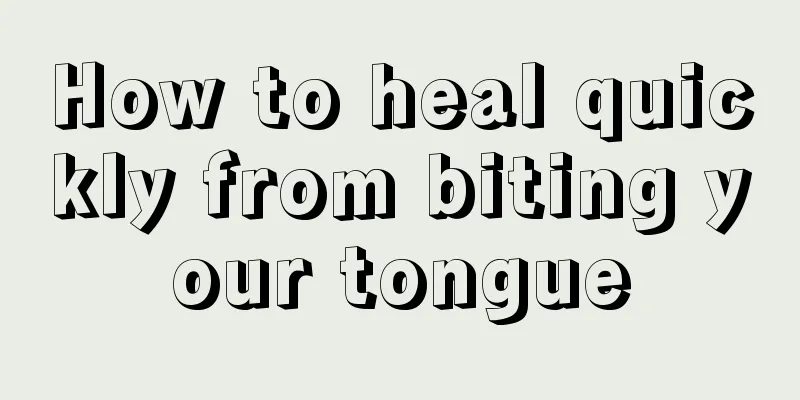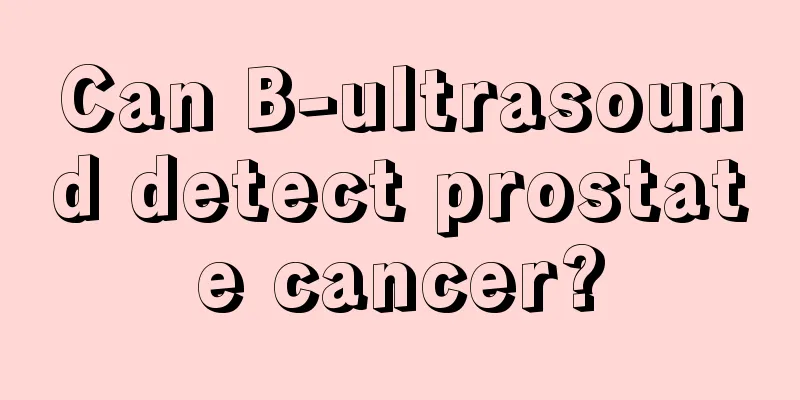How to heal quickly from biting your tongue

|
Many people accidentally bite their tongue when eating. After biting your tongue, be sure to treat it promptly to avoid infection at the wound site, which could lead to more serious oral problems. Generally speaking, after the tongue is bitten, you can choose to treat the wound by applying pressure to stop bleeding, gargling with salt water, gargling with hydrogen peroxide, etc. Here we will introduce these three treatment methods in detail! 1. Apply pressure to stop bleeding If the bite is bleeding, you must first apply pressure to stop the bleeding. The pressure from within the blood vessels causes the blood to flow out. Bleeding can be stopped by applying a pressure greater than the blood vessel pressure on the wound. Once the bleeding stops, the blood will clot. Additionally, applying compression can help reduce inflammation. You must: If you bite your tongue, keep it against the roof of your mouth. You can also press your tongue against your cheek. Apply ice to the bite (hold the ice cube intermittently until it melts completely). You can also apply pressure to the injured area with a clean cloth. 2. Rinse your mouth with salt water Salt water helps the bite heal faster and controls bacterial activity in the bite area. Salt absorbs water molecules, which has a penetrating and dehydrating effect, making the bitten area dry. Most bacteria cannot survive in a dry environment, so salt is important to keep bacteria under control and help promote wound healing. Here's how: Prepare 1 cup of warm water and 1 teaspoon of salt. Mix them together. Gargle with the salt water for 15 to 20 seconds, then spit it out. You can gargle with salt water three times a day (especially after meals) for three days in a row. Rinsing also helps remove food particles from the mouth, disrupts enzyme activity, and helps reduce swelling and pain. 3. Rinse your mouth with hydrogen peroxide The antibacterial effect of hydrogen peroxide helps control bacterial activity in the wound. The effervescent cleansing action of hydrogen peroxide removes debris and dead tissue from the wound surface. This helps the wound heal and protects the injured area from bacterial infection. In short, as long as you don't swallow hydrogen peroxide, it is an effective antibacterial agent. Here's how: Make a mouthwash by mixing equal parts 3% hydrogen peroxide and water. Place a small amount of hydrogen peroxide in your mouth, rinse your mouth thoroughly, and then spit it out. You can rinse your mouth twice a day for 3 consecutive days. You can also use a cotton swab to apply a small amount of hydrogen peroxide and water directly to the injured area. |
<<: What medicine to take for rotator cuff inflammation
>>: Treat hemorrhoids and internal hemorrhoids
Recommend
Can laryngeal cancer be transmitted by laryngoscopy?
Generally speaking, viruses are contagious, but t...
What can’t you eat after laser mole removal
Removing moles is a very popular thing in life, b...
Why does pain occur during intercourse?
Sex life is supposed to be a very happy thing, bu...
What are the consequences of not pulling out cracked teeth
In daily life, we must take good care of our teet...
100 meter running tips
We know that running can be divided into three ty...
How long can you live with advanced lymphoma? How to treat it?
For cancer patients, the later the disease is, th...
How to treat lumbar spinal stenosis and foot numbness?
In life, lumbar spinal stenosis is a disease of t...
Early symptoms of cauliflower warts
Many people have heard of the disease of genital ...
Causes of bleeding gums
We often see reports about bleeding gums in denta...
What should I do if small cell lung cancer metastasizes to the liver?
What should I do if small cell lung cancer metast...
What is the difference between bird's nest and bird's nest strips
People who like to take nutritional supplements k...
How can I slim my face by doing fitness?
In daily life, having a big face is a problem tha...
How to repair the sympathetic nerves
The sympathetic nerves play many roles in our hum...
What are the tips for zipping up?
Many items we use in daily life have zippers. Now...
How to clean foam soles
We all know that there are many kinds of sole mat...









